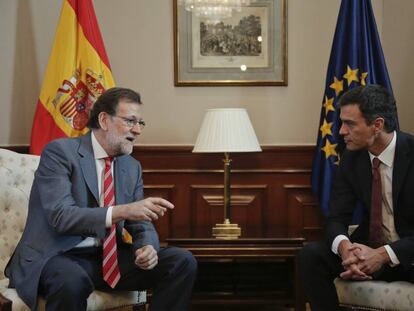Spanish PM ready to negotiate 125 points with opposition leaders
Mariano Rajoy will meet with Socialists and Ciudadanos on Tuesday and Wednesday; new survey shows Spaniards feel the PSOE should let conservatives form a government

Spanish acting prime minister Mariano Rajoy will meet with two opposition leaders this week in a bid to secure enough support to break a seven-month deadlock and form a government.
The Popular Party (PP) candidate wants to reach a deal in August, in time to get important legislation passed, including the 2017 budget and EU fiscal policy requirements.
So far, Socialist Party (PSOE) leader Pedro Sánchez and Ciudadanos president Albert Rivera have refused to endorse Rajoy, whose PP earned 137 seats at the repeat election of June 26. A congressional majority requires 176 seats.
Only supporters of the leftist coalition Unidos Podemos would rather see a third election than a PP government
Both say that Rajoy’s proposals for a governing program, which he sent them last month, simply mirror the PP’s campaign platform.
Now, Rajoy’s team has compared this program with the joint governing agreement that the Socialists and Ciudadanos came up with following the original election of December 20, and found 125 points in common.
Rajoy will use this apparent common ground to argue that “PP, PSOE and Ciudadanos share principles and priorities that are essential to the general interest of Spaniards.” He will meet with Sánchez and Rivera on Tuesday and Wednesday, shortly after King Felipe VI tasked him with trying to form a government.
Sign up for our newsletter
EL PAÍS English Edition has launched a weekly newsletter. Sign up today to receive a selection of our best stories in your inbox every Saturday morning. For full details about how to subscribe, click
His team holds that all three groups are “constitutionalist parties that defend the unity of Spain and equality for all Spaniards; they are moderate reform parties that propose growth-based, social and institutional reforms within the framework of our own political system; these parties are undeniably pro-European and pro-euro; they share a vision of foreign policy as state policy; they were able to foment and enlarge the pact against jihadist terrorism, and they were capable of joining criteria to address the greatest challenges of our territorial debate.”
The PP team would like a negotiating committee to sit down over the next three weeks to hammer out the specifics of the new deal, which would touch on a wide range of issues, from regional financing to education and gender violence.
However, in this quest for common ideas, Rajoy’s team has deliberately ignored some of the more specific proposals contained in the PSOE- Ciudadanos pact, such as the elimination of provincial authorities known as Diputaciones.
A new survey
Meanwhile, a new survey conducted for EL PAÍS finds that a majority of Spaniards (55%) feel the PP should try to form a government.
Yet 55% are sure that the conservatives will need to seek support from other parties to legislate, and think that this political term will be shorter than usual.
Also, 66% of Spaniards say that, in order to avoid a record third election in Spain, the Socialists should abstain at the investiture vote to name a new prime minister, therefore allowing Rajoy to get reinstated by omission.
So far, the party is ruling out this option. Sánchez has said that he “will not vote for the person we want to remove [from office].” He has claimed that his own voters would not understand it if he did. Yet the Metroscopia survey shows that a full 63% of Socialist voters defend an abstention in exchange for specific concessions from the PP.
Except for supporters of the leftist coalition Unidos Podemos, who would rather see a third election than a PP government, voters from all the main parties said the best option is a PSOE abstention in order to allow the most-voted party to govern.
English version by Susana Urra.
Tu suscripción se está usando en otro dispositivo
¿Quieres añadir otro usuario a tu suscripción?
Si continúas leyendo en este dispositivo, no se podrá leer en el otro.
FlechaTu suscripción se está usando en otro dispositivo y solo puedes acceder a EL PAÍS desde un dispositivo a la vez.
Si quieres compartir tu cuenta, cambia tu suscripción a la modalidad Premium, así podrás añadir otro usuario. Cada uno accederá con su propia cuenta de email, lo que os permitirá personalizar vuestra experiencia en EL PAÍS.
En el caso de no saber quién está usando tu cuenta, te recomendamos cambiar tu contraseña aquí.
Si decides continuar compartiendo tu cuenta, este mensaje se mostrará en tu dispositivo y en el de la otra persona que está usando tu cuenta de forma indefinida, afectando a tu experiencia de lectura. Puedes consultar aquí los términos y condiciones de la suscripción digital.










































